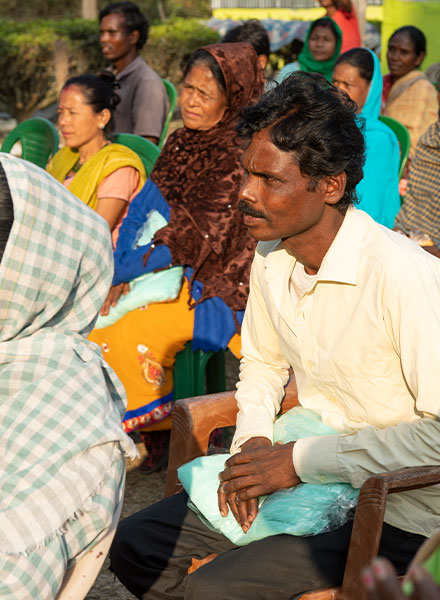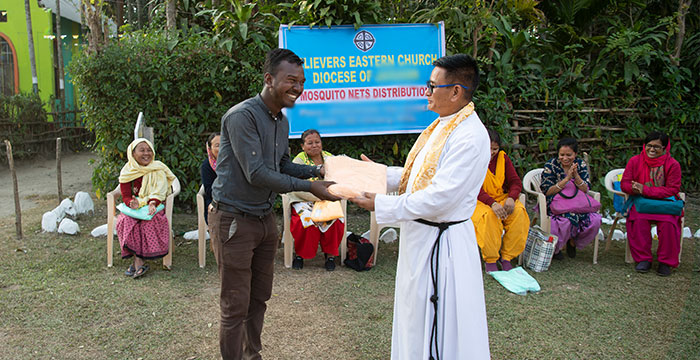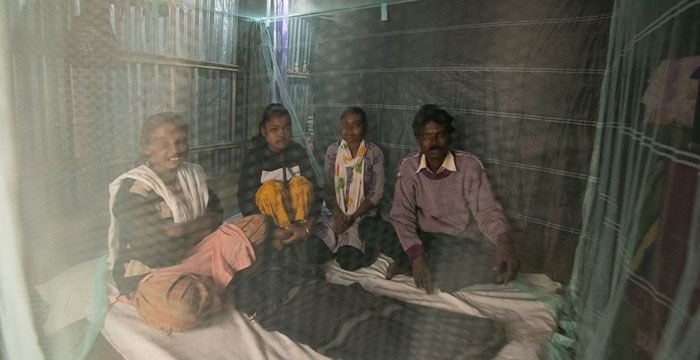Raise funds for mosquito nets
There are many ways you can fundraise, whether it’s a bake sale, a marathon, a party, or online – we would love for you to join the indigenous missionary movement by sharing what we do at GFA World in a fun way!
This website will offer limited functionality in this browser. We only support the recent versions of major browsers like Chrome, Firefox, Safari, and Edge.

Hywel, pictured here, sits with his new mosquito net.
The community Pastor Kagan serves suffers from mosquito-borne malaria year round. In the height of summer and after the rainy season, fevers indicative of malaria are especially common. Those villagers who can afford treatment make their way to the nearest private hospital. But, according to Pastor Kagan, around 75 percent of the community cannot afford to pay for quality medical care.
The easiest option available is a small, local medical centre. Unfortunately, while the care available at this clinic is free, the medicines are often not very effective at treating malaria. The only thing people can do is endure the illness and assuage the pain with natural remedies found in the surrounding jungle.
Most of the time, the villagers do not test for malaria—rather, they cannot test. But every year, the symptoms are the same: High fever, constant shivering, severe body aches.
“People sometimes think it is just a simple fever,” Pastor Kagan shares. “Sometimes people also don’t want to go to the health care centre that is nearby.”
However, life doesn’t always go back to normal. Malaria often debilitates people for weeks or even a month, and deaths from the disease are not uncommon.
Just last year, a lady in Pastor Kagan’s congregation passed away from malaria; the positive test results came in days after her passing. She left behind her husband and four daughters.
Kagan’s village is not alone in suffering from malaria. According to the World Health Organization’s 2021 World Health Report, nearly half the world’s population lives in areas at risk of malaria, and there has been an uptick in cases. In 2019, there were 227 million cases, but in 2020 the number rose to 241 million.
The current rise in cases is in part due to the disruption in services caused by the coronavirus pandemic. Previous years had seen a steady decrease in both cases and deaths.
These decreases are mainly attributed to developments in medicine and progress in medical care access, but one factor in preventing the disease has remained steadfast: mosquito nets.
In 2019, there were 227 million cases, but in 2020 the number rose to 241 million.

Pastor Kagan, pictured left, happily receives his new mosquito net from Pastor Rodan.
“We can protect ourselves when we put the mosquito nets up,” Pastor Kagan says.
Distributing insecticide-treated nets in malaria-endemic countries has proven to be the largest contributor to the drops in malaria incidents, according to the World Health Organization. Another benefit of mosquito nets is protection from the many other insects, and even snakes, that enter people’s houses, especially during the rainy season. Nets also help people rest well since insect bites can continually disrupt their sleep, causing victims to live and work with constant fatigue. Supplying nets is easy and cost-effective, especially for communities that have limited access to medical care—like Pastor Kagan’s.
For quite some time, Pastor Kagan and one of his leaders, Pastor Rodan, had prayed they would be able to distribute mosquito nets. Then, they got the good news: The funds they needed were available. The pastors immediately went to work.
Pastor Kagan, familiar as he was with his own community, worked with members of his church to gather the names of those who needed nets the most. After compiling a list, they purchased the nets and Pastor Rodan distributed to around 100 families, including Pastor Kagan’s family, who also lacked protection against mosquitos. One of the recipients, Hywel, had recently recovered from malaria at the time of the distribution.
“Not only I, but both my daughters had malaria a couple of months back,” Hywel, father of two, shares. “All that we could do was go to the primary health care center and ask [for] medicines free of cost. Whatever medicines they give, we take, and that’s how we fight malaria, or any diseases caused by mosquitoes.”

Hywel and his family (pictured) are thankful for the mosquito net that will protect them during the night.
Hywel couldn’t afford the mosquito net on his own; he would have had to save wages for 3 to 4 months just to afford one net. But thanks to the GFA pastors, Hywel is looking forward to the protection the nets will provide.
“If I am protected from the mosquito bites, we definitely will not get malaria or dengue,” he says. “If we are not sick, we will be able to work. Every day I will be able to work, work for my family, work for my children’s education, and all the sicknesses caused by mosquitoes will not hinder me now. That’s what I’m looking forward to.”
Millions of families in Africa and Asia are still at risk from mosquito-borne diseases, but you can help change that. By providing mosquito nets, you can help protect families from malaria and other devastating diseases.
There are many ways you can fundraise, whether it’s a bake sale, a marathon, a party, or online – we would love for you to join the indigenous missionary movement by sharing what we do at GFA World in a fun way!